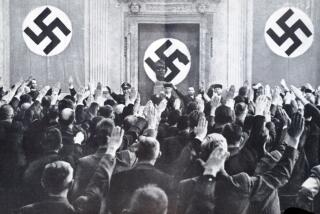Ignoring the Roots
- Share via
There is something about George Bush’s speech Monday that puts us in mind of the Irish parliamentarian of whose career it was said that “he resolutely resisted any responsibility more pragmatic than rhetoric.” How else to explain the puzzling package of crime-control measures the President announced, and the way in which it manages to be both reckless and timid at the same time?
In the first instance, Bush proposes a sweeping expansion of various expensive and problematic legal and penal measures, which already have failed to deter crime to any measurable degree. They include wider application of the death penalty, further erosion of fundamental rights to due process, enhancement of sentences already approaching the extreme and construction of vast new federal prisons. At the same time, by refusing to endorse rational regulation of military-style firearms, the President declined to take the one concrete step virtually guaranteed to reduce the level of criminal violence on America’s streets.
The worst thing about this initiative, taken all together, is that dealing with it will further delay serious consideration of the complex social problems too often lumped together as “the crime issue.”
Speaking to more than 6,000 uniformed law officers who had gathered on the Capitol steps to honor the 151 policemen killed in the line of duty over the past year, Bush summarized his proposals this way: “We’re going to take back the streets by taking the criminals off the streets. It’s an attack on four fronts--new laws to punish them, new agents to arrest them, new prosecutors to convict them and new prisons to hold them.”
What the President’s proposal will not do is remove from the criminals’ hands the semiautomatic assault weapons used to kill many of the murdered officers in whose memory Monday’s gathering was convened. Instead, Bush would restrict the import of only those foreign, military-style firearms deemed to lack a legitimate sporting purpose. Semiautomatic weapons allowed into the country and those manufactured here would have their magazine size restricted to a still-substantial 15 rounds.
Given the magnitude of the danger these weapons pose, it isn’t much. It is, however, apparently all that can be undertaken by an Administration cowed by the political power of the National Rifle Assn. and its allies. The majority of Americans favor reasonable regulation of assault weapons, but they will have to content themselves with Bush’s admonition that “the right to own guns is not a license to harm others.”
Unfortunately, the President’s broad appreciation of Second Amendment liberties does not seem to extend to other provisions of the Bill of Rights. His proposals to apply the federal death penalty to crimes committed with certain firearms and to require that juveniles be tried as adults in serious drug cases are measures unworthy of America’s commitment to a system of justice drawn from the Constitution. Two of Bush’s other suggestions are similarly disturbing. One would create a so-called “good faith” exception allowing the introduction in court of evidence obtained in illegal warrantless searches. The other would impose a one-year limit on access to federal habeas corpus relief.
In the end, though, perhaps the most curious thing about Bush’s billion-dollar, anti-crime package is not what it contains, but what it lacks--that is, some hint of how all this is going to be paid for, and some serious consideration of the roots of crime.
More to Read
Get the L.A. Times Politics newsletter
Deeply reported insights into legislation, politics and policy from Sacramento, Washington and beyond. In your inbox twice per week.
You may occasionally receive promotional content from the Los Angeles Times.









